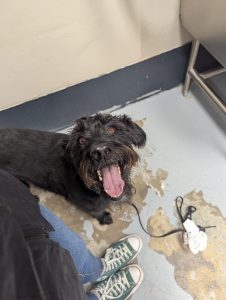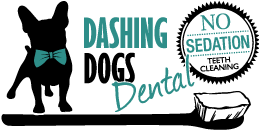Pet allergies are a common issue for many people, causing discomfort and distress due to various allergens present in animals. Understanding pet allergies, including their causes, symptoms, and treatment options, is crucial for those who experience allergic reactions to pets. In this article, we’ll explore the key aspects of pet allergies, helping you manage and alleviate symptoms effectively.
At Dashing Dogs Dental, while our main focus is on your pet’s teeth cleaning services, we know that their comfort and wellness go hand-in-hand. That’s why we’re here to help you understand everything about pet allergies, because every pet deserves to live itch-free.

What Are Pet Allergies?
Pet allergies happen when a dog or cat’s immune system overreacts to everyday substances, like pollen, food ingredients, or flea saliva, as if they were harmful invaders. These allergic reactions can trigger skin irritation, respiratory distress, or digestive issues.
Types of Pet Allergies
- Environmental allergies: Caused by dust, mold, or pollen.
- Food allergies: Triggered by ingredients like beef, chicken, or grains.
- Flea allergies: Caused by a reaction to flea saliva after a bite.
- Contact allergies: Occur when the skin comes into contact with irritants like shampoo, grass, or cleaning agents.
What Causes Pet Allergies?
Just like humans, pets encounter countless allergens daily. However, their reactions can vary depending on genetics, age, and exposure.
Environmental Allergens
Pollen, mold spores, and dust mites are the top culprits. These allergens can stick to your pet’s coat and paws after outdoor play, causing itching and redness.
Food-Related Causes
Common allergens include proteins like chicken, beef, lamb, eggs, soy, and dairy. Sometimes, additives or fillers in processed food can also trigger reactions.
Flea and Insect Bites
Even one flea bite can cause intense itching if your pet is allergic to flea saliva. This is known as Flea Allergy Dermatitis (FAD), one of the most common types of pet allergies.
Seasonal Changes
Spring and summer bring an increase in pollen and humidity, leading to more skin flare-ups. Conversely, winter may cause dry skin, which can worsen allergic symptoms.
Recognizing Signs and Symptoms
Identifying allergy symptoms early helps prevent complications.
Common Skin Symptoms
- Constant scratching or biting at certain spots
- Red, inflamed, or flaky skin
- Hair loss or thinning patches
- Chronic ear infections
Respiratory Symptoms
Sneezing, coughing, or watery eyes often point to environmental allergies.
Behavioral Signs
If your pet seems restless, irritable, or is licking excessively, these could be signs of discomfort due to itching or inflammation.
How Pet Allergies Affect Oral Health
You might be surprised to learn that allergies can also impact your pet’s mouth. Constant scratching or licking can introduce bacteria, leading to oral irritation or secondary infections. At Dashing Dogs Dental, our team often notices early allergy symptoms during dental cleaning because oral and skin health are closely connected.
How to Combat Pet Allergies at Home
Regular Grooming and Cleaning
Brush your pet often to remove dirt and allergens. Bathing with hypoallergenic or oatmeal-based shampoos can soothe the skin and reduce itchiness.
Allergen-Free Diet
Switching to a limited-ingredient or prescription diet can help identify food triggers. Always introduce new foods gradually.
Creating a Pet-Safe Environment
Use air purifiers and vacuum frequently to remove allergens. Wash bedding weekly with fragrance-free detergent.
Natural Remedies
Coconut oil, aloe vera, and omega-3 supplements can help reduce inflammation and support healthy skin.
 How Veterinarians Diagnose Allergies
How Veterinarians Diagnose Allergies
Veterinarians follow a systematic approach to pinpoint the cause.
Allergy Testing
Blood tests, intradermal skin testing, or elimination diets help identify allergens.
Rule-Out Process
Other conditions, like infections or parasites, must be ruled out before confirming allergies.
The Role of Dental Techs
At Dashing Dogs Dental, while we specialize in no-sedation dental cleaning, we also observe oral signs that may hint at underlying allergies, such as inflamed gums or excessive drooling.
Treatments and Medications
Antihistamines and Steroids
These relieve itching and inflammation but should be prescribed by a vet to avoid side effects.
Immunotherapy
Customized allergy shots or oral drops can help build tolerance over time.
Topical Treatments
Medicated sprays, shampoos, and ointments provide quick relief for irritated skin.
Specialized Dental Care
Routine dental cleanings at Dashing Dogs Dental help remove bacteria buildup that may worsen inflammation or oral discomfort caused by allergies.
Preventive Care for Pets with Allergies
Prevention is all about consistency. Regular grooming, dental visits, balanced nutrition, and flea prevention can reduce allergic flare-ups dramatically.
When to Seek Professional Help
If home remedies don’t work or your pet’s condition worsens, such as excessive scratching, open sores, or hair loss, it’s time to consult a vet. They can prescribe targeted medication and design a treatment plan.
Dashing Dogs Dental’s Role in Overall Pet Health
At Dashing Dogs Dental, our goal goes beyond clean teeth. We care about your pet’s comfort, confidence, and happiness. Through our no-sedation dental services, we ensure your pet remains calm, safe, and happy because oral hygiene supports the immune system, reducing allergic risks and infections.
Supporting Your Pet’s Immune System
Strong immunity helps your pet fight allergens naturally. Provide a nutrient-rich diet, plenty of water, and regular exercise. Probiotics and supplements can also enhance overall resilience.
Myths About Pet Allergies
- Myth: Only outdoor pets get allergies.
Fact: Indoor pets can suffer too, from dust, cleaning agents, and fabrics. - Myth: Allergies can be cured completely.
Fact: They can’t be cured, but symptoms can be effectively managed. - Myth: All itchy pets have fleas.
Fact: Many itchy pets have allergies unrelated to fleas.
Tips for Long-Term Allergy Management
- Schedule regular vet check-ups.
- Keep your pet’s bedding and living area clean.
- Maintain dental hygiene with Dashing Dogs Dental’s no-sedation cleanings.
- Use vet-approved shampoos and supplements.
- Avoid smoking or using strong scents around your pet.
FAQs
- Can dental problems make my pet’s allergies worse?
Yes. Oral infections or inflammation can trigger or worsen allergic reactions. Regular cleanings help maintain overall health. - Are no-sedation dental cleanings safe for pets with allergies?
Absolutely! They minimize risk by avoiding anesthesia, which some pets may react to. - How often should I bathe my allergic pet?
Once every 1 to 2 weeks, using hypoallergenic shampoo helps control itching without drying the skin. - Can diet changes really improve allergies?
Yes. Many allergies are food-related, so a controlled, allergen-free diet can significantly help. - How do I know if it’s an allergy or just dry skin?
Persistent itching, redness, or ear infections are strong indicators of allergies. Consult your vet for confirmation.
Helping Your Pet Live Allergy-Free
Pet allergies can be frustrating, but with awareness, prevention, and the right care, your furry friend can live a happy, comfortable life. Understanding the causes, recognizing symptoms early, and maintaining proper dental and overall hygiene are key.
At Dashing Dogs Dental, we’re here to support you every step of the way. Because a healthy smile starts with a healthy pet, and we believe every pet deserves both.











